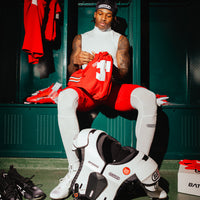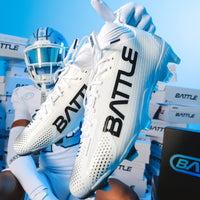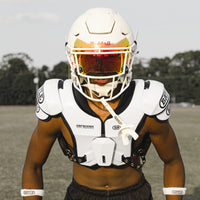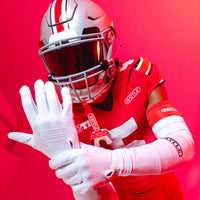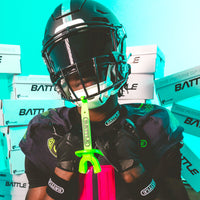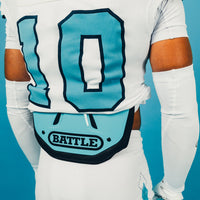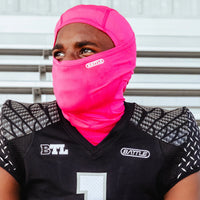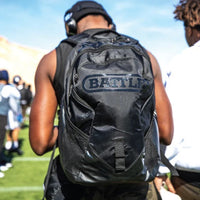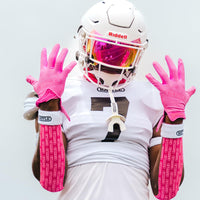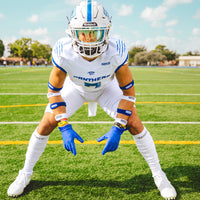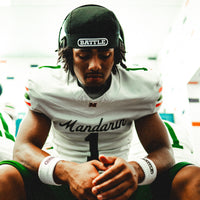Nearly 2.5 million kids play some form of organized flag football—and that number continues to skyrocket by the year.1
A youth sport doesn’t become one of the fastest-growing in America for no reason. To compete for attention, it must offer fun, challenge, and community.
So, there’s no surprise: Flag football offers a laundry list of perks from healthy competition to powerful social connection. Discover the benefits of flag football and decide if it’s right for your rising athlete.
#1 Safe and Low-Risk Sport
Tackle football, despite its thrilling gameplay, does come with risk. Injuries and concussions happen.2 While fortified helmets and altered rules help reduce risk, many parents prefer lower-impact sports.
Flag football, with its limited contact, offers the thrill of gridiron competition minus the takedowns and pileups. It’s a perfect choice for driven athletes who want to prioritize agility and speed over brute force.
With fewer injury concerns, players can focus on developing core football skills (which translate well to tackling if they want to make the jump later). These include:
- Catching
- Throwing
- Offensive tactics
- Routing
- Defensive formations
Despite tackling’s absence, play formation follows the same logic and positioning as full-contact. It simply subtracts intense collisions from the equation, preventing joint injuries and concussions (damage compounds over time).
Reduced Risk of Concussions and Serious Injuries
In a flag football game, you won’t find3:
- Tackling
- Blocking
- Diving
- Screening
- Fumbles
Tackling and high-impact kickoffs pose the greatest chance of head-on collisions.2 The absence of such physical plays massively reduces the risk of concussions and major injuries (especially to the brain and spine).
While incidental sprains or bruises still occur (as they do in all sports), the injuries found in flag football are far less severe than those encountered in tackle football.
If your player shows interest in football, but must master fundamentals first, flag offers an ideal, low-impact training ground. Transferring to tackle down the road remains totally feasible.
#2 Promotes Teamwork and Communication
One of life’s most important skills, teamwork features heavily in flag football. Success stems from coordinated offensive plays and well-honed defensive formations. Each link in the chain plays a role, and kids learn rapidly how to best support their teammates and set up shop in the endzone.
Since football plays unfold across a vast space and account for countless variables, collaboration plays a key role in this sport. For kids coming from a non-athletic background, this form of collaborative connection can be life-changing.
Players also exercise their minds. As game scenarios shift, strategy evolves. While coaches set the direction, players must keep strategy in mind and flawlessly execute their role. This sharpens tactical thinking and performance under pressure.
Leadership Development
Navigating chaotic situations calls for a calm mind and the ability to direct others without becoming a tyrant. Flag football, with its fast-paced plays and complex strategy, offers a perfect incubator for future leaders to hone their chops.
Flag football features a number of prospective leadership roles for players looking to take charge:
- Team captain – Captains represent the team to officials (for example, they conduct the opening coin toss). They also encourage their teammates and strive for victory to keep morale high, even during tough stretches.
- Playmaker – Offensive players (often quarterbacks or receivers) tasked with executing game-altering maneuvers, playmakers lead the charge to the endzone and inspire their team.
As players sharpen their skill sets, these roles await, offering new players the opportunity to learn how to follow before seizing the reins.
#3 Enhances Physical Fitness
There’s no question that flag football offers a full-body workout, heavy on speed and dexterity. Over the course of a game or practice, players will fully tap their energy stores.
A few concrete benefits of diving into this intense gauntlet:
- Cardiovascular health and endurance – The sprinting rarely ceases, and players’ hearts remain in overdrive throughout the game. This offers an ideal way to raise endurance and maintain a healthy heart.
- Improved agility and speed – Flag football’s endless darting and dashing help players hone their agility. Practice drills focus heavily on footwork and field vision, while games demand rapid directional shifts.
- Enhanced muscle strength – When it comes to muscles, “use it or lose it” is a universal truth. Fortunately, flag football taps every muscle in the body (especially the legs and core).
Long-time flag football players often develop a toned physique to pair with a set of lightning-quick reflexes.
This kind of intense activity also offers a perfect entry point into healthy physicality for sedentary kids. And the extra dose of fun and teamwork often makes it more appealing than simply performing calisthenics or running.
#4 Teaches Sportsmanship and Respect
Team sports require more than raw physical power. Victory belongs to squads that foster positive energy and work as a cohesive unit. Striving for a goal alongside others promotes camaraderie and solidarity—both hugely transferable life skills.
Flag football also teaches interpersonal lessons in:
- Fair play – The game’s rules require above-board tactics and mutual respect.
- Graceful victory and defeat– Flag football provides the experience of both triumph and loss. Players learn to navigate each with grace and grit.
- Communication skills – Calling plays, alerting teammates to tactical shifts, listening to coaches—all represent excellent ways to develop communication competence.
In general, working with others for a purpose offers one of the best containers for positive social interaction and solid sportsmanship. Think:
- Shaking hands with opponents before and after games
- Celebrating victories together
- Striking the balance between pride and humility
All these merge together into one powerful, character-building experience.

#5 Great for All Skill Levels
If you can run, catch, and throw—even at a basic level—you can play flag football. But that doesn’t mean it’s unchallenging. This low barrier to entry, combined with a sky-high ceiling for development, makes it a perfect fit for all skill levels.
Inclusive for New and Experienced Players
As a new and growing sport, flag football doesn’t feature much in the way of entrenched legacy. In other words, your player won’t be the only newbie on the field. This fresh and upcoming atmosphere makes the flag football field an inviting environment for rookie and veteran players alike.
Teams usually feature a wide range of skill levels. Everyone learns and grows together.
Flexible and Fun for Everyone
Flag football features straightforward rules. Coaches can easily tone down the intensity to suit beginners. It also requires sparse equipment, so you can readily adjust gameplay to suit unorthodox settings or smaller groups.
Above all: It’s a blast. Dashing for the endzone or leaping for an interception—it doesn’t get more thrilling than that. Any young athlete looking to get endorphins pumping and form lasting memories should look no further than the flag football turf.
#6 Encourages Friendships and Social Interaction
As the digital world expands, kids need opportunities for in-person interaction more than ever. Flag football offers a prime opportunity for youth to immerse themselves in the physical world—a powerful antidote to device-driven distraction.
Remaining in flow and engaged in the moment offers benefits on its own. But pair such immersion with social connection, and you have a perfect recipe for supporting mental health and fostering connection.
Building a Strong Community
Working together for a common purpose—that’s the backbone of social bonding. Knowing your role (kicker, quarterback, receiver) and how you contribute to a team’s overall success promotes a sense of belonging.
Chatting between plays, carpooling to and from games, and even grabbing burgers after practice are small but mighty social bricks that make up a resilient community.
Over time, in-game cooperation and off-field fun catalyze the sort of camaraderie that fuels lifelong relationships.
Social Benefits Beyond the Game
Over time, consistent positive interactions add up. As players grow together—pushing past adversity and tasting victory side by side—friendships can’t help but form. And friendships grounded in concrete goals last the longest.
Plus, with youth sports, the community extends beyond the turf. Flag football puts families side by side in the stands.
Parents, siblings, and grandparents all mingle and cheer together. Rooting for other families’ kids, coordinating post-practice dinner plans, putting together the end-of-year barbecue—all of that strengthens social threads across generations.
Positive Role Models
While parents and family serve as primary role models, kids benefit from external inspiration too: think coaches, older players, and team captains.
Flag football, with its layers of coaching and support staff, offers kids a chance to draw wisdom and inspiration from people outside the family—people with their own unique backgrounds, strengths, and leadership styles.
Get Your Player Ready with Battle Sports Football Gear
With a stack of benefits like these, who needs pile-ups? Flag football enhances fitness, invites confidence, and promotes social bonding—and kids crave all three. If you’re ready to explore the world of flag football, send your player fully equipped for safety and performance.
At Battle Sports, we’ve got you covered. Our collection of high-end football gear gets new players up to speed in no time.
Add some gridiron grit and team spirit vibes to your player’s life. Do so safely, and in style: Join the Battle Sports crew, by athletes for athletes.
Sources:
- NFL. Flag Football Growth. https://operations.nfl.com/learn-the-game/flag-football/flag-football-growth/
- CDC. Data on Sports and Recreation Activities.https://www.cdc.gov/heads-up/data/index.html
- NFL Flag. Flag Football Rules. https://nflflag.com/coaches/flag-football-rules






